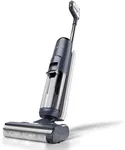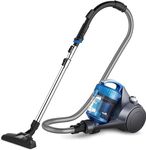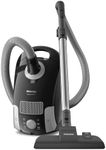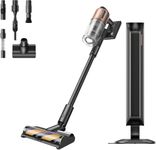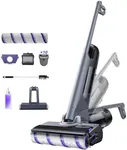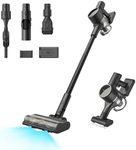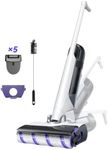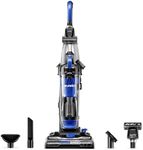Buying Guide for the Best Vacuums For Hardwood Floors
Choosing the right vacuum for hardwood floors is all about protecting your floors while keeping them clean and dust-free. Hardwood can be easily scratched or damaged by the wrong vacuum, so it's important to focus on features that are gentle yet effective. Think about your cleaning habits, the size of your space, and whether you have pets or allergies. The right vacuum will make cleaning easier and help your floors look their best for years to come.Suction PowerSuction power refers to how strongly the vacuum can pull in dirt and debris. For hardwood floors, you want enough suction to pick up dust and small particles, but not so much that it risks damaging the floor or sucking up area rugs. Vacuums often have adjustable suction settings; lower settings are usually best for hardwood. If you have a lot of fine dust or pet hair, a model with strong but adjustable suction is ideal. If your floors are mostly free of heavy debris, a moderate suction level will do the job without being too harsh.
Brush Roll TypeThe brush roll is the spinning part at the bottom of many vacuums that helps lift dirt. On hardwood floors, a stiff or aggressive brush roll can scratch the surface. Look for vacuums with a soft brush roll, a brush roll that can be turned off, or no brush roll at all. If you have a mix of rugs and hardwood, a vacuum with a switchable brush roll is helpful. For homes with only hardwood, a vacuum designed specifically for hard floors is safest.
Weight and ManeuverabilityWeight and maneuverability describe how easy the vacuum is to move around. Lightweight vacuums are easier to carry up stairs and less likely to leave marks if bumped against furniture or walls. If you have a large area or multiple rooms, a vacuum that glides smoothly and turns easily will make cleaning less tiring. If you have a small space or lots of furniture, a compact and agile vacuum is best.
Filtration SystemThe filtration system determines how well the vacuum traps dust and allergens. HEPA filters are the gold standard for capturing tiny particles, which is important if you have allergies or pets. If you or your family are sensitive to dust, choose a vacuum with a high-quality filter. If allergies are not a concern, a standard filter may be sufficient.
Floor Protection FeaturesFloor protection features include things like rubber wheels, felt strips, or soft bumpers that prevent scratches and scuffs. These are especially important for hardwood floors, which can be easily marked by hard plastic or metal parts. If you want to keep your floors looking new, look for vacuums with these protective touches.
Noise LevelNoise level is how loud the vacuum is when running. Some vacuums are much quieter than others, which can be important if you have young children, pets, or live in an apartment. If you prefer a peaceful cleaning experience, look for models that advertise low noise or quiet operation. If noise isn’t a big issue for you, this may be less important.
Corded vs. CordlessCorded vacuums plug into the wall and can run as long as you need, while cordless vacuums run on batteries and offer more freedom of movement. If you have a large area to clean or don’t want to worry about battery life, a corded vacuum is a good choice. If you value convenience and quick cleanups, a cordless model may be better. Think about how long you usually spend cleaning and whether you mind managing a cord.

